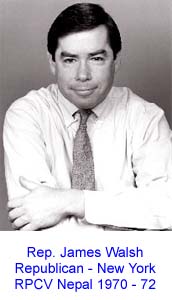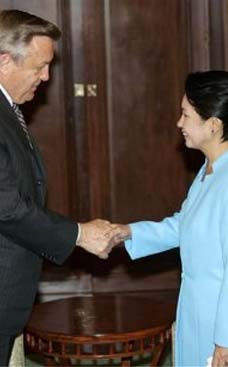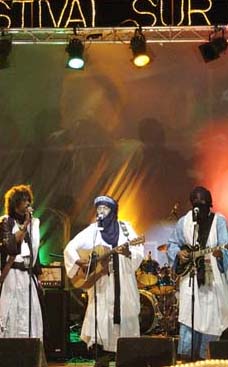
Few can argue that the current situation in Iraq is good. Violence between the sects continues. The government favors Shia over Sunni. Al-Qaeda continues to slaughter innocent civilians and the rebuilding of the electrical grid, the oil infrastructure and the establishment of the Iraqi security forces have been disastrous. The President believes that by adding more troops, he can turn the situation around. I disagree, and I’ve told him so. I came out publicly last December in opposition to a troop surge – weeks before the President formally proposed such a strategy in February. In March, I broke with my party to go on record opposed to the deployment of additional troops. Today's U.S. military role in Iraq should be to assist in support and training initiatives, not to lead the charge. This resolution did not call for us to step out. Rather, it called for Iraq to step up. As Commander in Chief, the President chose not to follow that direction. Is there room for hope at this dark hour? Maybe a little. There have been some small signs of progress. Sunnis are working with the U.S. military to fight against Al-Qaeda in the troubled Anbar province. Shia militant cleric Al Sadr’s followers left the Maliki government, and it has not fallen. The Kurds in the north are developing their region rapidly in relative peace, and the Shia south is also quiet most of the time. Iraqi and U.S. diplomats are finally engaging with all of Iraq’s neighbors. Perhaps the most important question is, “Can we allow an anti-American Islamist government to take over Iraq?” Or worse, “Can we have Iraq become a lawless state like Afghanistan was, where Al-Qaeda could prosper and grow in strength?” We as a nation – and our soldiers in particular – have sacrificed much to prevent that. Let me be clear, while voting to sustain the President’s veto, I did not sign a blank check. I do not abdicate my responsibility to provide needed oversight. And I do not advocate for a troop build up. General Petraeus has asked for time to implement his new strategy. He’ll assess in September. I think we have to give him that much time. Congressman James Walsh of New York served as a Peace Corps Volunteer in Nepal in the 1960's.
Walsh releases open letter on Iraq
May 7, 2007
AN OPEN LETTER TO CENTRAL NEW YORK
By now everyone is aware that President Bush vetoed the Emergency War Supplemental spending bill last week. His reasoning is that the legislation ties his hands as Commander in Chief and also those of the generals on the ground in Iraq. The bill – while providing the needed funding to protect and sustain our troops in battle in Iraq and Afghanistan – would set a firm deadline to end the U.S. military’s involvement in Iraq, thus notifying friend and foe that our commitment would end on a date certain.
Congressional Democrats have since failed to secure the votes necessary to override the President’s veto. I agree that troop funding legislation should not include timetable language and voted against the override. So where do we go from here?
For starters, a new spending bill needs to be written right away. We’ve placed our military men and women in harm’s way, and we have an obligation to provide these troops in battle with the tools they need to do an incredibly difficult and often deadly job.
At the same time, the President does not and should not have a blank check to continue the conflict. But what is the most appropriate balance in this situation? I use this opportunity to share with you my thoughts on where we are, how we got here, and where we need to go as I see it.
First let me provide you with an overview of where I stand. Like the overwhelming majority of my House and Senate colleagues – on both sides of the aisle, I voted to give the President original authority in 2002 for military action in Iraq if conditions warranted. And the great majority of the American people supported that decision.
Our subsequent military efforts achieved a great deal, including every military objective set forth at the outset. Saddam Hussein’s reign of terror was ended, and the Iraqis have self-governance, a new constitution, and ostensibly freedom – all meaningful and monumental accomplishments.
But Lord knows mistakes have also been made. The complexity and depth of the religious and ethnic differences in the region were lost on the White House and the Congress. The President declared victory prematurely. And the battle goes on as American service men and women continue to lose their lives and casualties mount.
Most Americans today want out of Iraq, as do I. But the dilemma remains how we leave without making a bad situation worse. Congressional Democrats want to set a firm date for complete withdrawal within months. Senate Democratic Leader Harry Reid has said publicly that we’ve lost. It seems to me that even if you believe so privately, you don’t say so publicly. Such a message emboldens our enemies who are listening and greatly destroys the morale of our troops who need and rely upon our united support.
Few can argue that the current situation in Iraq is good. Violence between the sects continues. The government favors Shia over Sunni. Al-Qaeda continues to slaughter innocent civilians and the rebuilding of the electrical grid, the oil infrastructure and the establishment of the Iraqi security forces have been disastrous.
The President believes that by adding more troops, he can turn the situation around. I disagree, and I’ve told him so. I came out publicly last December in opposition to a troop surge – weeks before the President formally proposed such a strategy in February.
In March, I broke with my party to go on record opposed to the deployment of additional troops. Today's U.S. military role in Iraq should be to assist in support and training initiatives, not to lead the charge. This resolution did not call for us to step out. Rather, it called for Iraq to step up. As Commander in Chief, the President chose not to follow that direction.
We now have a new Secretary of Defense and a new commander on the ground in Iraq. They are implementing this new strategy in Baghdad where the vast majority of the violence is occurring. Combined with an increase of Iraqi forces, they are clearing neighborhoods of terrorist and insurgent cells and setting up precinct houses to hold the ground.
General Petraeus, briefing Congress last week, believes it will work. He has said that he will report back to Congress in September on his plan’s progress. That assessment must be fair without interference from the White House. The world will be watching.
Is there room for hope at this dark hour? Maybe a little. There have been some small signs of progress. Sunnis are working with the U.S. military to fight against Al-Qaeda in the troubled Anbar province. Shia militant cleric Al Sadr’s followers left the Maliki government, and it has not fallen. The Kurds in the north are developing their region rapidly in relative peace, and the Shia south is also quiet most of the time. Iraqi and U.S. diplomats are finally engaging with all of Iraq’s neighbors.
Perhaps the most important question is, “Can we allow an anti-American Islamist government to take over Iraq?” Or worse, “Can we have Iraq become a lawless state like Afghanistan was, where Al-Qaeda could prosper and grow in strength?” We as a nation – and our soldiers in particular – have sacrificed much to prevent that.
Let me be clear, while voting to sustain the President’s veto, I did not sign a blank check. I do not abdicate my responsibility to provide needed oversight. And I do not advocate for a troop build up. General Petraeus has asked for time to implement his new strategy. He’ll assess in September. I think we have to give him that much time.
I’ve also strongly encouraged the White House to just as forcefully pursue two other tracks simultaneously. We need to put at least as much effort into diplomacy with Iraq’s neighbors. They – more than anyone – will benefit from a stable Iraq, and once we leave their neighborhood, they’ll have far more influence there than we will.
Additionally, we need to pressure the Maliki government to meet as equals with the Sunnis. They need to resolve the issues of revenue sharing and de-Baathification at a minimum. As I’ve said before, there will never be a solution as long as the Sunnis believe there is nothing for them in this new democracy. This dispute will only end peacefully with the ballot, not the bullet.
If Petraeus’ plan is successful, it will be obvious before September. His judgment should surprise no one. If it’s not working, we should be prepared to begin withdrawing our soldiers. If it is working, that will change the debate in this country. Until then, Congress has an obligation to our troops to give them the resources they need, without politics attached.
As a representative, my most important responsibility is to represent my constituents and their views. But it is difficult in situations like this when so many divergent viewpoints exist. Some see dire consequences if we leave precipitously. Others tell me that our soldiers are the flashpoint and that when we leave the source of agitation will no longer exist.
Just as with the justification for our intercession in Vietnam, the so called “Domino Theory” failed to materialize after our departure. So too may these nightmare scenarios for Iraq disappear. But potential Al-Qaeda control of one-fifth of the world’s oil paints a horrific picture.
Who really knows? What I do know is that there is nothing more powerful than public opinion. The people still rule the country. As representatives, we need to be in touch with the complex of views of those who elect us. Today most of the people of Central New York tell me they want us to leave Iraq. I agree.
The real question is how? If anyone says it’s simple, they’re wrong. It’s complicated and dangerous with potentially disastrous consequences. I’m prepared to give General Petraeus the time for which he is asking. I’m prepared to vote for continued funding for the war free from language setting a timetable or deadline, but only until his September report.
I’d very much appreciate hearing your view as well. Write me at P.O. Box 7306, Syracuse, New York 13261 or email me through my online office at http://walsh.house.gov. While you’re there, be sure to sign up for my regular e-newsletter to stay current on issues before Congress. Thank you for your interest.
Sincerely,
James T. Walsh



















